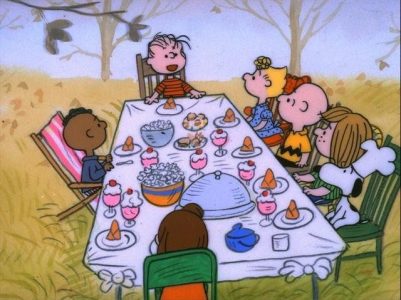Thanksgiving Dinner: a comedy of manners


Thursday – 4:27pm: Guests are arriving in three minutes. No, not guests, relatives – Mother (who still thinks Thanksgiving should be prepared “her way”), Father (who never really understood why his daughter married “that guy”), Mother-in-law (who’d rather not be left alone in the same room with your mother), Father-in-law (who thinks toddlers love being spun around by their ankles) and other assorted social instigators.
Kids? Forget the kids. Your head is already swimming with too much to do, too many people to please, too many family landmines to avoid. You’re just going to close your eyes and wish for the best. The children obviously know THIS is the time to “be good”.
I don’t think so. So, let’s back up time. It isn’t three minutes to company. Its the week before and you have the power to teach your children to be socially savvy.
The Easy Things
Saturate your children in politeness – at home, in restaurants, with store clerks. Children love using manners because they love the art of the game. “Please” and “thank you” are power words, paying them off with gloating smiles. Children learn “please” and “thank you” and “please pass the butter” through immersion and repetition.
Be attentive to pro-social behavior. We need to explicitly teach children how to act around other people. For example: make eye contact when listening, use quiet voices inside, say “excuse me” if you want attention, and it’s okay to say “no, thank you”. These are all easy behaviors to teach once we realize these are skills that are learned through guidance.
Clarify your expectations. Family gatherings and holiday events also provide opportunities for children to do things differently than the typical day-to-day. Children may not understand that some older people need assistance. Let them know their great grandmother would love it if they would hold her hand and walk with her to the dining room. Kindness is often remembering another person’s point of view.
Similarly, new settings come with new rules. Be explicit. “I don’t want you to chase the dog through the house while the guests are here”. Or, “today, I want you to wait to start eating until I give you our secret signal”. And pppplease, no burping contests at the table!”
Kids Do and Say the Darnedest Things
Keep your sense of humor no matter what. Children’s innocence often leads them to say things we wish they wouldn’t. Things about grandpa’s stomach or Aunt Karen’s breath. Monitor your own stress levels. You want to be quick on your feet and nimble of mind, not bogged down with the minutia of entertaining.
Modify your expectations. Children live in the moment. They spread joy easily unless something throws them off. Meltdowns flare up quickly when routines are changed and they are hungry, tired, and just generally out of sorts. Forget about making a picture-perfect Hallmark moment and help your child. Take a few minutes alone together in her room or play outside for awhile before dessert. This is the time for adults to revise their expectations in line with children’s reality.
The Hard Things
Be respectful of differences and agree to disagree. Differences in temperament and in beliefs are a little harder to negotiate. Children may need an advocate for their individual needs. Parenting choices may be challenged. Discipline debates escalate. Be ready to put into words that everyone is loved and accepted exactly as they are.
Know in advance what pushes everyone’s buttons and have a plan. For example, if there’s someone who nitpicks on your child’s eating behavior; seat them far away from your child. From menu choices to scheduling, look for those win-win solutions.
Rehearse with your children how to respond to provocations. Coach your child to say “my mom told me I didn’t need to eat the green bean casserole” instead of ‘I hate it when you come to dinner here and wish you’d never come back”. Give your child time, before and after, to unload his emotions. Children need your mature perspective on stressful conflicts.
The purpose of manners is to create a wonderful space for everyone to enjoy. Poise is always tested under pressure. Prepare for the worst. You’ll be teaching your children to give their best, no matter what.





Follow Us
Join the conversion. Make sure to follow us on our social platforms for the latest content and FamilyTime news.